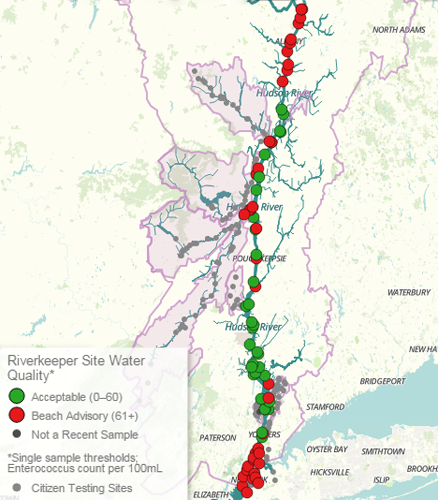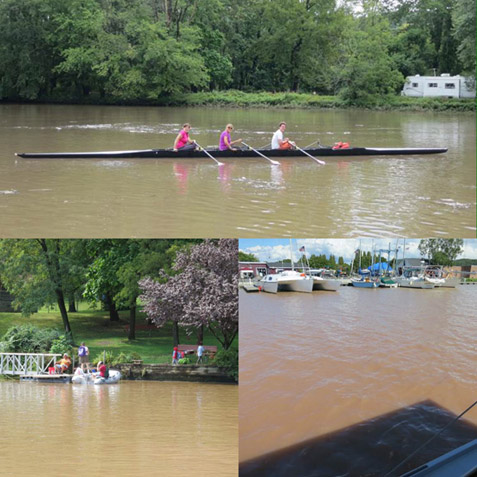|

The water quality monitoring portion of this September’s patrol took place during wet weather. At least an inch of rain fell in the 72 hours before sampling at all locations tested, and much more in most places. Not surprisingly, our samples from most New York City and Albany sites failed the EPA’s recommended criteria for safe swimming (60 Entero/100 mL).
However, Entero counts at some mid-channel sites around NYC, and even at some nearshore sites in the Capital District, were around 100 cells/100 mL—not extreme failures. Counts were much greater in our samples from the mouths of the Catskill, Esopus and Rondout Creeks, all at the upper limit of detection (>2,420 cells/100 mL).
 |
| Heavy rain produced turbid water and high Entero counts in the Rondout, Catskill and Esopus Creeks. Photo: John Lipscomb |
During this patrol, community sampling in the Saw Mill River watershed fell on the same day as Capt. John Lipscomb sampled the Yonkers area from the R. Ian Fletcher. This means that we have a one-of-a-kind water quality snapshot in the Saw Mill River and its Hudson River receiving water. Community partners at the Center for the Urban River at Beczak sampled from the upper Saw Mill River near its headwaters in Chappaqua all the way to the recently daylighted section in Yonkers. Riverkeeper staff sampled the Hudson River influenced by the Saw Mill and at mid-channel in Yonkers.
The data show that the Saw Mill River was a source of fecal pollution to the Hudson at the time we sampled. Throughout the Saw Mill River watershed, most Entero counts were in the tens of thousands. The count in mixed Hudson River/Saw Mill River water was 6,488, and the count at Yonkers mid-channel was <10, our minimum level of detection.
Also at Riverkeeper.org now are the latest results from community sampling in the Catskill Creek, Esopus Creek, Rondout Creek. Check Riverkeeper.org soon for results of early October sampling in the Pocantico River, Quassaick Creek and Sparkill Creek.
Note that the results presented here and on the Web represent a snapshot in time, and are not indicative of water quality today. We encourage the public to explore the historical data as one way to make informed choices about where and when to enter the water.
Generous funding for Riverkeeper’s Water Quality Program, has come from many sources, including from our partners at CUNY Queens College and Lamont-Doherty Earth Observatory of Columbia University; and, the Austen-Stokes Ancient Americas Foundation, Chris and Suzanne Augustin, Dale and Laura Kutnick, Dextra Baldwin McGonagle Foundation, Double R Foundation, Eppley Foundation for Research, HSBC Water Programme, Hudson River Foundation for Science and Environmental Research, John McLaughlin, Michele Hertz and Larry Friedman, The Nancy and Edwin Marks Family Foundation, New England Interstate Water Pollution Control Commission (NEIWPCC), S. Mackintosh Pulsifer, Mike Richter, Sun Hill Foundation and the Wallace Research Foundation, and many Riverkeeper members.
The contents of this report do not necessarily reflect the views and policies of NEIWPCC or any other funder, nor does the mention of trade names or commercial products constitute endorsement or recommendation for use.
|
WATER QUALITY DATA
Hudson River Estuary
New York City waterfront
Ossining waterfront
Catskill Creek
Esopus Creek
Mohawk River
Pocantico River
Quassaick Creek
Rondout Creek
Saw Mill River
Sparkill Creek
Wallkill River
EVENTS
Public Meeting: Speak up for the future of Flushing Bay
September 30, 6 PM
Flushing, NY
Submerge: New York City Marine Science Festival
October 3, 11 AM
New York, NY
Friends of Muchattoes Lake Fall Projects
October 3, 17 and 31
Newburgh, NY
Water Quality, Moving from Monitoring to Action
October 7, 7:30 PM
Ossining, NY
Community Tree & Shrub Planting along Sparkill Creek
October 10, 9 AM
Sparkill, NY
Southeast New York Stormwater Conference
October 14, 9 AM
Beacon, NY
Wallkill River Watershed Alliance Meeting
October 21, 7 PM
New Paltz, NY
Wallkill River Boat Brigade: Sturgeon Pool
October 25, 2:45 PM
Rifton, NY
Sewage Associated Microbes in the Hudson River Estuary: Sources, Distribution & Ecological Connections
December 1, 10:30 AM
New York, NY
FROM THE BOAT BLOG
On Patrol: Baby snapping turtle in Catskill Creek
IN THE NEWS
Campaign Highlights Three Ways Homeowners Can Protect Water Quality
Riverkeeper
What's That Green Stuff Floating in the Water?
Poughkeepsie Journal
Saw Mill River Being Tested for Sewage
Westchester Journal News

|
